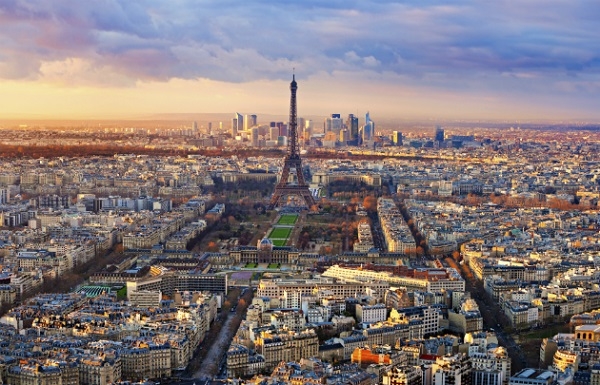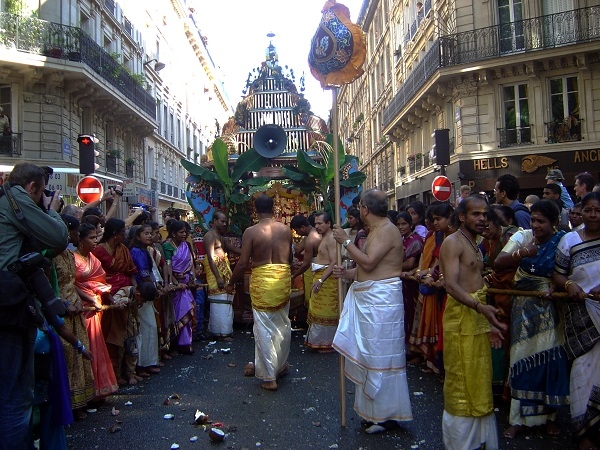Paris Times - II
16 Jul 2020 10:06:38
We looked at the presence of India or the Indian subcontinent in Paris, in the 1st part. We will now look at how certain French people I came across, felt connected with India and such things.

The French Disposition
The French smile at you easily and frequently, quite unlike the English. It struck me instantly as a few samples of English stiffness (not only the upper lip) was available around for ready reference. The experience of interacting with commoners in Paris was absolutely pleasant. When I say this, I don't necessarily mean here the colleagues, but strangers. The common men and woman on the streets were often courteous, and extremely helpful, should you need any help to locate an address or something. It happened with me a few times that a very old white (looking retired but not tired) gentleman or a lady of colour carrying fairly heavy baggage and waiting in a long-route bus queue, didn't mind leaving their work momentarily and help out a foreigner like me till I got things right. They spoke little English, but that hardly bothered them to do what they thought was their duty. I was happy to see the great Indian theory of "Atithi Devo Bhava" being put into actual practice in Paris.
The world cup soccer fever was at its peak. My host country France was considered a strong favourite, as it generally is. I could imagine their mental status when they were defeated by the (so called) third world countries Mexico and South Africa, and were finally ousted from the race. However, the appreciable thing is that the French stopped at discussing the issue with whatever passion, at their lunch & dinner tables only. Their players didn't feel insecure about their lives or properties like their counterparts in Columbias or Bolivias of the world. In India too, any kind of defeat on the cricket field not only saddens but also maddens us. Surprisingly enough, defeats elsewhere don't impact us similarly e.g. the infamous 26/11 episode of cross-border terrorism in Mumbai, which is yet hanging on undecidedly.
The French Connection

The French also seemed to like India. One of my colleagues (pucca original Frenchman) regularly watches Hindi movies with his family. His favourite female actor then was Rani Mukherji (don't know whether he had revealed that to his wife). A bus driver (another Frenchman) engaged with my company confided in me that listened to only Bollywood songs, though he didn’t comprehend their meaning. When I quizzed him a little, he pulled out a number of CDs stored in the bus as the proof. That collection of his included "Best of Shahrukh Khan" which he showed me again & again, expecting may be a pat on his back.
I avoided telling him that I hated SRK (how much & why), for obvious reasons. You may not believe but I found the third Frenchman in the Ganesh temple, which I dutifully visited after having a sumptuous “pur” vegetarian lunch in the suburb of La Chapelle. It did interest me to wait and interview him and know more about his point of attraction to a Hindu deity, but he was immersed in his silent prayers for so long that it left me with little patience to wait more. I had to give in to the basic instinct of reaching for the bed as early as possible for a nice Sunday afternoon siesta.
I was fortunate to undergo 40 hours of French language lessons, thanks to the arrangement made by my employer. It was more fortunate for me that it happened at the hands of a teacher, who apart from being an extremely good human being, knew her job too well. She too was interested to know as much about India and was possibly happy to find a good source in me. Our interaction progressed more into exchange of notes about each other’s culture than teaching and learning the language, though taking the basic lessons in the language from a native French teacher like her has helped me grasp the fundamentals so well that I can still deal with the written language comfortably for grasping an overall understanding even after a decade.
Our progression into partners on equal terms led her to take initiative for taking me on short city tours during the tuition periods, elevating her status from language to history/culture teacher. I toured almost all places of importance like the Louvre, Rodin’s residence/museum, Victor Hugo’s mansion/museum, the 17th century military hospital Les Invalides, the historic hilly district of Montmartre, the UNESCO headquarter and such other places with her, under her expert guidance. Our interaction was divided in two instalments i.e. two visits of mine.
Experiencing an extraordinary warmth from this Guru, I had decided on an appropriate Guru-dakshina. I bought a small Saraswarti idol for the purpose, which I carried to Paris on my next trip. I gave it to her on the last day of our meeting, explaining the propriety of the gift as Saraswati being the Indian goddess of education and arts. And God, was she happy! Very much! I lost the count as to how many times she must have thanked me for that. Can you call this my uncanny way of promoting India’s soft power? Well, you can! I even demonstrated to her the yogic kriyas of Anulom-Vilom, the sound of Aum on that day, acting as India’s cultural ambassador. It’d not be out of place to mention here that India is Inde in French. If you pronounce it the English way, it comes out as Indu (close to Hind or Hindu), though the prevalent French pronunciation is Aand (with soft d).
The highlight of my March’10 trip was a coffee meeting with Francois Gautier. He doesn’t need an introduction for those who are tuned in with the current affairs on the social media, especially the Twitter; for those who are not, I'd advise a Google-search. He's a Frenchman with an Indian soul, devoted in the service of mother India after a successful journalistic career in France. He then was working on a mega project of a museum of true Indian history in Pune, the bhoomipujan of which was done at the hands of none other than Sri Sri Ravishankar. We met in a bistro, in the proximity of the iconic Eifel tower, where he had stopped for a cuppa post his morning jog. The Chhatrapati Shivaji Maharaj Museum founded by him under a non-profit banner ‘Foundation for Advancement of cultural ties’ (FACT) became open for public two years later, which is worth a visit by all.
Last but not the least, one of my French colleagues mentioned to me about her husband who around 15 years ago had wandered through India for as long as eight months at a stretch, fascinated by its cultural and spiritual richness. According to her, he too swore by his Indian soul, and believed that he was born in India in his previous birth. I'd have loved to meet him one day and know more about his mooring, but there was unfortunately no occasion.
More about my touristy experience in Paris and around, in the next part! So long!